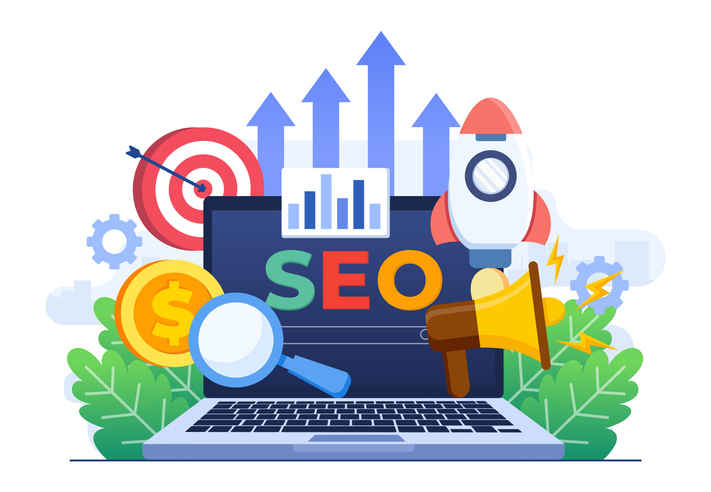4 min read
3 min read
Boosting Website Ranking: Top SEO Strategies!
![]() The Amazing Team at Focus Digital Marketing
:
May 20, 2024 10:00:00 AM
The Amazing Team at Focus Digital Marketing
:
May 20, 2024 10:00:00 AM
The Rise of Digital Marketing: Revolutionizing the Way Businesses Connect with Customers
Digital marketing has become an integral part of the modern business landscape. With the rapid advancement of technology and the increasing dependence on the internet, this form of marketing has revolutionized the way businesses connect with customers, allowing them to target and engage with their audience more effectively. In this article, we will delve into the definition, history, importance, current trends, challenges, solutions, statistics report, and future prospects of digital marketing.
Definition:
Digital marketing encompasses all marketing efforts that utilize electronic devices and the internet. It includes various channels such as search engines, social media, email, websites, and mobile applications. The goal of digital marketing is to reach and engage with potential customers, build brand awareness, drive traffic and conversions, and foster customer loyalty.
History:
The concept of digital marketing emerged in the 1990s with the rise of the internet. Initially, it primarily involved basic methods like email marketing and banner advertisements. As the internet evolved, so did digital marketing strategies. The introduction of search engine optimization (SEO) in the late 1990s allowed businesses to optimize their websites to appear higher in search engine results. With the advent of social media in the 2000s, digital marketing further expanded its reach, enabling businesses to engage with customers on platforms like Facebook, Twitter, and Instagram.
Importance:
Digital marketing has become crucial for businesses in today's digital age for several reasons. Firstly, it allows businesses to target their audience accurately. Through various data analytics tools, businesses can gather information about their customers' demographics, preferences, and behaviors, enabling them to create personalized marketing campaigns. Secondly, digital marketing provides businesses with measurable results. Unlike traditional marketing methods, digital marketing allows businesses to track their marketing efforts in real-time, providing insights into the effectiveness of their strategies. Lastly, digital marketing is cost-effective. Compared to traditional marketing channels like TV or print ads, digital marketing offers a higher return on investment, particularly for small and medium-sized businesses.
Current Trends:
The digital marketing landscape is constantly evolving, with new trends emerging regularly. Some of the current trends include:
1. Influencer Marketing: Businesses are increasingly collaborating with influencers who have a significant following on social media platforms. Influencer endorsements can help businesses reach a larger audience and build trust among consumers.
2. Video Marketing: With the popularity of platforms like YouTube and TikTok, video content has become a driving force in digital marketing. Businesses are employing video content to engage with customers, showcase products, and convey information effectively.
3. Voice Search Optimization: Growing adoption of voice-activated devices like smart speakers has led to the need for voice search optimization. Businesses are optimizing their content to appear in voice search results, enabling them to reach consumers who rely on voice commands.
Challenges and Solutions:
While digital marketing offers numerous benefits, it also presents challenges for businesses. Some common challenges include the constant evolution of digital platforms, increasing competition, and maintaining data privacy and security. To address these challenges, businesses need to stay updated with the latest trends and technologies, conduct thorough market research, create unique and engaging content, and prioritize data privacy and security measures.
Statistics Report:
According to a recent report by eMarketer, worldwide digital ad spending is projected to reach $455 billion by 2024, representing a significant increase from the $273 billion spent in 2018. The report also highlights the dominance of mobile devices in digital ad spending, with mobile accounting for more than 70% of total digital ad spending.
Future Prospects:
The future of digital marketing looks promising, with advancements in artificial intelligence (AI), augmented reality (AR), and virtual reality (VR) shaping the industry. AI-enabled chatbots are being used to enhance customer service, while AR and VR technologies are being employed to provide immersive experiences and improve product visualization. Additionally, the rise of personalization and automation in digital marketing will continue to drive customer engagement and marketing effectiveness.
Relevant 5 FAQs:
1. Why should businesses invest in digital marketing?
Investing in digital marketing allows businesses to reach their target audience more effectively, measure their marketing efforts, and achieve a higher return on investment compared to traditional marketing methods.
2. How can businesses track the effectiveness of their digital marketing campaigns?
Businesses can track the effectiveness of their digital marketing campaigns through various metrics such as website traffic, conversion rates, click-through rates, social media engagement, and revenue generated.
3. What are the key elements of a successful digital marketing strategy?
A successful digital marketing strategy should include thorough market research, identification of target audience, development of engaging content, utilization of various digital channels, continuous tracking and analysis of data, and adaptation based on consumer insights.
4. How can businesses optimize their websites for search engines?
Businesses can optimize their websites for search engines by implementing SEO techniques such as keyword research, on-page optimization, technical optimization, and link building. Providing high-quality and relevant content is also crucial for search engine visibility.
5. How can businesses ensure data privacy and security in digital marketing?
To ensure data privacy and security, businesses should implement proper data protection measures, adhere to relevant regulations like GDPR, obtain user consent for data collection, use secure data storage systems, and regularly update and monitor security protocols.
In conclusion, digital marketing has transformed the way businesses connect with customers, offering targeted and measurable marketing strategies. By staying on top of current trends, embracing new technologies, and addressing challenges, businesses can harness the power of digital marketing to enhance their online presence, drive customer engagement, and achieve growth. To learn more about digital marketing, visit Focus Digital Marketing's website, the ultimate resource for all your digital marketing needs.

6 min read
Mastering Local SEO Strategies for Higher Rankings
Digital marketing is an ever-evolving strategy that businesses around the world are adopting to stay relevant in today's digitally-driven world. In...

5 min read
Organic Search Engine Optimization: Unveiling The Mysteries
Explore the secrets behind Organic Search Engine Optimization and how it can elevate your website's visibility and search engine rankings.



